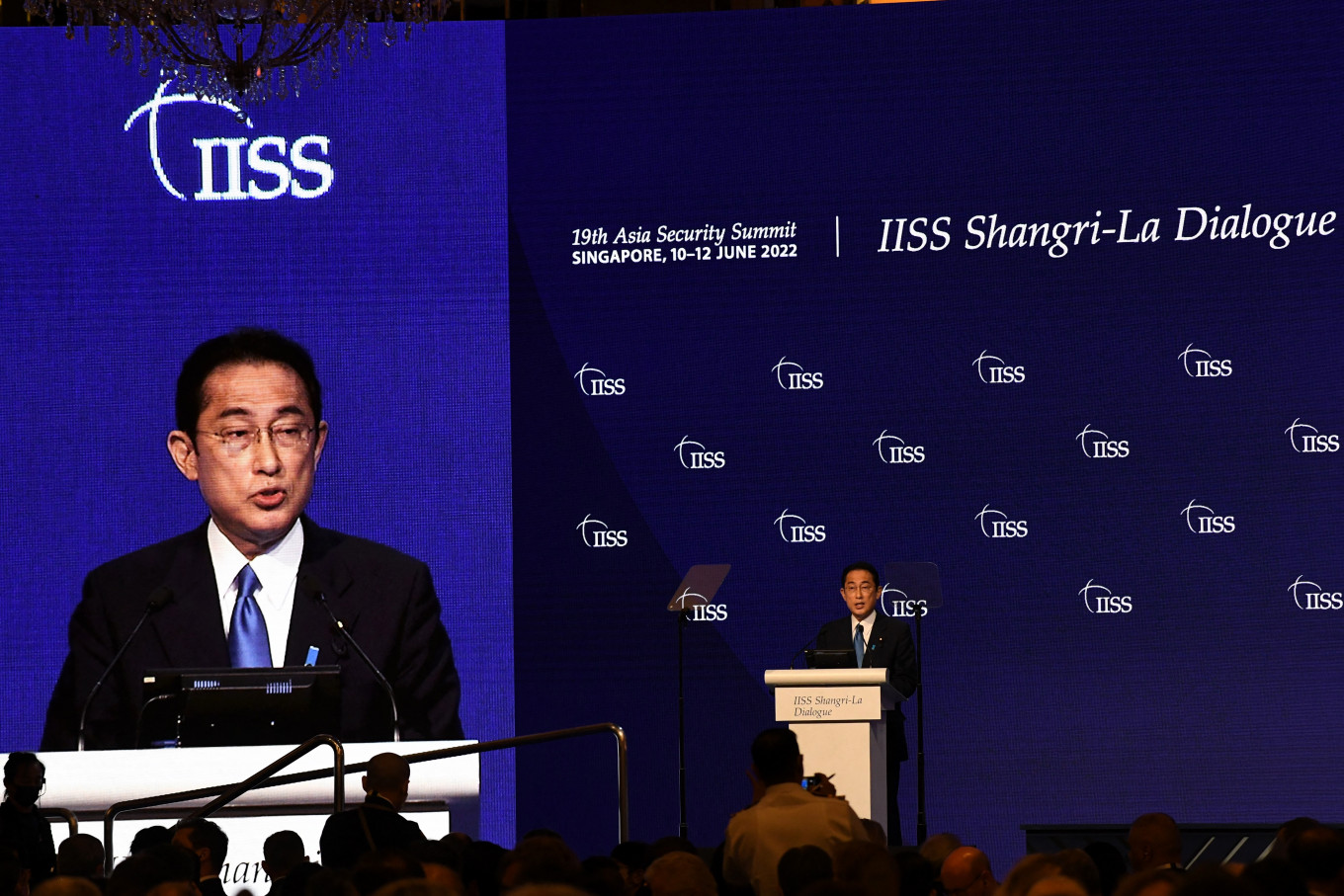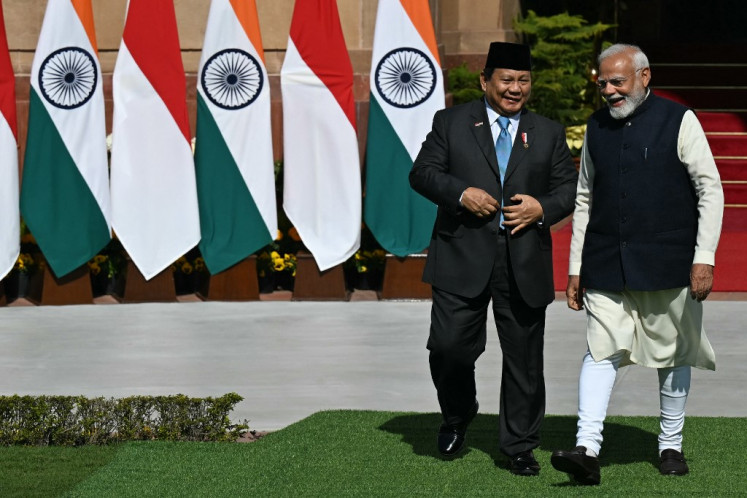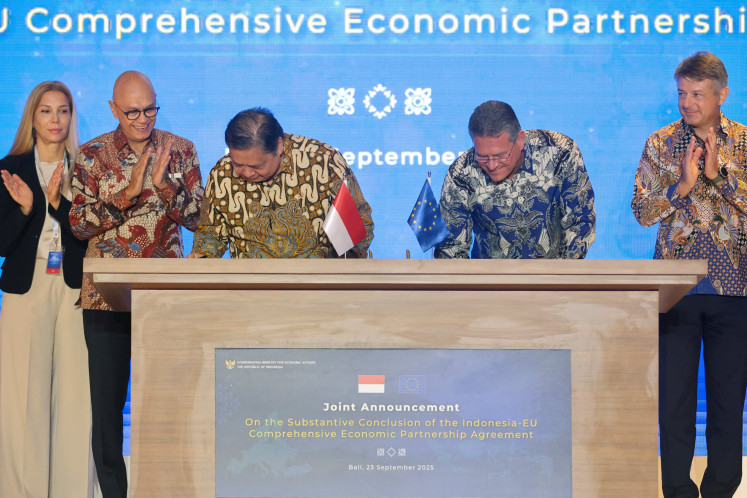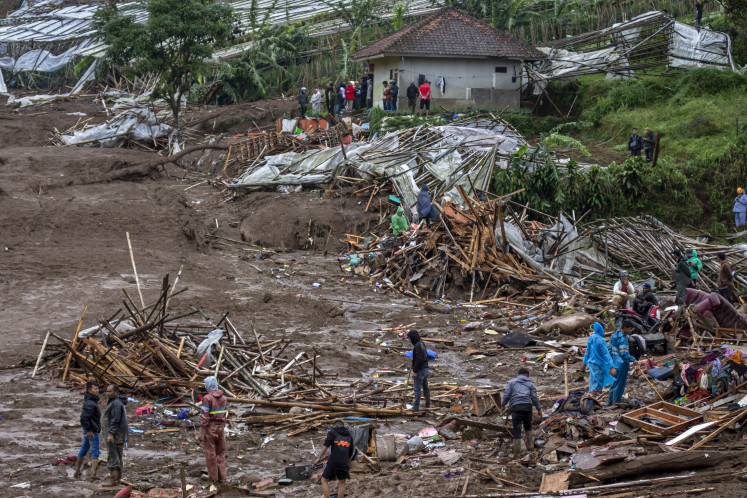Popular Reads
Top Results
Can't find what you're looking for?
View all search resultsPopular Reads
Top Results
Can't find what you're looking for?
View all search resultsPM Kishida’s defense doctrine and ASEAN’s position
Amid the escalating tension between the United States and China, Japan’s military muscle will be strategically beneficial for ASEAN.
Change text size
Gift Premium Articles
to Anyone
J
apanese Prime Minister Fumio Kishida has promised that by the end of this year, he will launch Japan’s National Security Strategy for the next five years, which is – simply put – a military build-up. He plans to double Japan’s defense budget to 2 percent of the country’s gross domestic product (GDP). Even at the current scale, Japan is already the world’s ninth-largest defense spender.
In his speech, Kishida assured ASEAN of his government’s commitment to prioritizing the association in its foreign policy, including Japan’s growing role in the Indo-Pacific. ASEAN has long demanded that Japan play a more central role in the region, especially in the South China Sea.
But there are no details yet about Kishida’s commitment, and Indonesia, ASEAN’s biggest member, has remained silent, at least publicly, about his military policy.
China’s assertiveness in claiming the East China Sea and the South China Sea as its property, North Korea’s continuing nuclear weapon threats and Russia’s invasion of Ukraine are the three most important reasons for Kishida’s boost of Japanese military power.
Some has voiced concern that Japan could repeat its horrifying World War II military acts against Asian neighbors, especially China, South Korea and North Korea – as well as Indonesia. The concerns are understandable, but it is unrealistic to demand Japan keep the post-war status quo intact while its neighbors continue to significantly increase their military power.
ASEAN member states have opted to take a more pragmatic stance and wait for more concrete cooperation with Japan apart from military purposes.
In his keynote speech at the Shangri-La Dialogue, Kishida said the drastic increase in Japan’s defense budget was needed to fundamentally reinforce its defense capabilities, including its counterstrike capabilities.
“As the security environment surrounding Japan becomes increasingly severe, we will set out a new National Security Strategy by the end of this year. I am determined to fundamentally reinforce Japan's defense capabilities within the next five years and secure a substantial increase of Japan's defense budget needed to effect it,” Kishida said.
Japan, Kishida said, would consistently and vigorously support the ASEAN Outlook on the Indo-Pacific (AOIP), which ASEAN has developed as its basic policy.
Amid the escalating tension between the United States and China, Japan’s military muscle will be strategically beneficial for the 10 members of ASEAN to counterbalance the rising contest between the global powers in the region. Japan is consistently perceived as the most trusted state partner for ASEAN, both in terms of economic cooperation and military cooperation.
According to the Stockholm International Peace Research Institute, the 10 largest state military spenders are:
1. The United States (US$801 billion)
2. China ($293 billion)
3. India ($76.6 billion)
4. The United Kingdom ($68.4 billion)
5. Russia ($65.9 billion)
6. France ($56.6 billion)
7. Germany ($56.0 billion)
8. Saudi Arabia ($55.6 billion)
9. Japan ($54.1 billion)
10. South Korea ($50.2 billion)
Kishida chose Singapore as the place to announce his so-called “Kishida Doctrine”.
His predecessors had also launched strategic decisions for ASEAN. One notable instance was in 1974, when major anti-Japanese riots in the capitals of ASEAN member states erupted in protest of the “economic hegemony” of Japan.
That year in January then-Japanese prime minister Kakuei Tanaka visited Thailand, the Philippines, Singapore, Malaysia and Indonesia. The region was the main target of aggressive Japanese investment and exports.
University students in the countries expressed anger at what they felt was the arrogant behavior of Japanese companies and the rampant bribery to get concessions and protection from military and government officials.
The worst riots occurred in Jakarta – called Peristiwa Malari or the Jan. 15 Catastrophe. Japanese offices and factories were burned down, forcing Tanaka to scale down his visit. Protesters also condemned the behavior of the Japanese military during its occupation of Indonesia.
University students, especially those from the University of Indonesia, were also upset by Indonesia’s heavy dependence on Japanese exports of machinery, technology and processed industrial supplies.
Since then, Japan has been very sensitive to anti-Japanese sentiment, and Tokyo has launched various economic and development aid programs for the region.
Fukuda Doctrine
Then-prime minister Takeo Fukuda introduced the “Fukuda Doctrine” when he concluded his ASEAN tour in Manila on Aug. 17, 1977. Japan continues to use the doctrine as the backbone of its foreign policy in the region, and cumulatively, it has been the largest foreign investor in and money lender to ASEAN. In the last two decades, Japanese domination has declined as China has steadily risen as the world’s second-largest economy.
The Fukuda Doctrine holds that, first, Japan rejects the role of military power, and on that basis is resolved to contribute to the peace and prosperity of Southeast Asia and the world community.
Second, Japan will do its best to consolidate relationships based on “heart-to-heart” understandings with countries of Southeast Asia, not only in economic areas but also in social and cultural areas.
Third, Japan will be an equal partner of ASEAN and its member countries and cooperate positively with them to strengthen solidarity and resilience.
Miyazawa’s peacekeeping force
In his Shangri-La speech, PM Kishida said he wanted to follow up on the achievement of Miyazawa, who had succeeded in advancing Japan’s position in international security affairs. The United Nations approved Japan’s self-defense forces to participate in the United Nations Transitional Authority in Cambodia (UNTAC) from 1992 to 1993. The Diet had previously passed the Peacekeeping Operation Cooperation Act in June 1992.
Japan’s participation in Cambodia was internationally praised and became a new cornerstone for Japanese non-combative overseas military operations.
For ASEAN, Japan will always be expected to be a key source of investment, trade and transfer of technology. And Japan has proven that it consistently delivers its promises.
Countries in this region are waiting for a much clearer plan from Kishida for the region, apart from Japan’s military buildup. The region needs Japan to balance the US-China rivalry.
***
The writer is a senior editor at The Jakarta Post.











